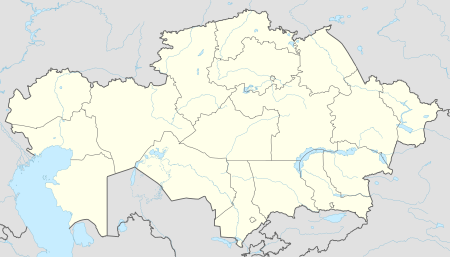This article needs additional citations for verification. (January 2024) |
Urunkhayka (Kazakh: Урүнхайка, Ürünhaika) is a small village in Kazakhstan. It is on the eastern border of Lake Markakol in Katonkaragay District of East Kazakhstan Region.
Urunkhayka
Урүнхайка Ürünhaika | |
|---|---|
 | |
| Coordinates: 48°47′0″N 86°01′31″E / 48.78333°N 86.02528°E | |
| Country | |
| Region | East Kazakhstan Region |
| District | Katonkaragay District |
| Elevation | 1,450 m (4,750 ft) |
| Population | |
| • Total | 165 |
| Time zone | ALMT |
Climate
editUrunkhayka has a subarctic climate (Köppen: Dfc),[1] characterized by extremely cold, snowy winters and cool summers.
| Climate data for Urunkhayka (1991–2020) | |||||||||||||
|---|---|---|---|---|---|---|---|---|---|---|---|---|---|
| Month | Jan | Feb | Mar | Apr | May | Jun | Jul | Aug | Sep | Oct | Nov | Dec | Year |
| Mean daily maximum °C (°F) | −17.1 (1.2) |
−12.3 (9.9) |
−4.4 (24.1) |
5.1 (41.2) |
12.7 (54.9) |
18.9 (66.0) |
20.7 (69.3) |
19.6 (67.3) |
13.9 (57.0) |
6.5 (43.7) |
−2.8 (27.0) |
−13.0 (8.6) |
4.0 (39.2) |
| Daily mean °C (°F) | −22.2 (−8.0) |
−18.2 (−0.8) |
−10.7 (12.7) |
−0.6 (30.9) |
6.7 (44.1) |
12.7 (54.9) |
14.6 (58.3) |
13.2 (55.8) |
7.8 (46.0) |
1.0 (33.8) |
−7.8 (18.0) |
−17.6 (0.3) |
−1.8 (28.8) |
| Mean daily minimum °C (°F) | −27.0 (−16.6) |
−23.9 (−11.0) |
−17.2 (1.0) |
−5.7 (21.7) |
1.7 (35.1) |
7.1 (44.8) |
9.1 (48.4) |
7.5 (45.5) |
2.5 (36.5) |
−3.2 (26.2) |
−11.3 (11.7) |
−21.7 (−7.1) |
−6.8 (19.8) |
| Average precipitation mm (inches) | 30.6 (1.20) |
28.8 (1.13) |
34.2 (1.35) |
41.3 (1.63) |
49.5 (1.95) |
54.2 (2.13) |
69.9 (2.75) |
63.6 (2.50) |
54.2 (2.13) |
49.8 (1.96) |
49.0 (1.93) |
44.6 (1.76) |
569.7 (22.43) |
| Average precipitation days (≥ 1.0 mm) | 7.5 | 7.0 | 6.5 | 6.9 | 8.0 | 8.1 | 9.9 | 8.6 | 7.7 | 7.9 | 8.8 | 9.6 | 96.5 |
| Source: NOAA[2] | |||||||||||||
References
edit- ^ "Table 1 Overview of the Köppen-Geiger climate classes including the defining criteria". Nature: Scientific Data.
- ^ "World Meteorological Organization Climate Normals for 1991-2020 — Urunkhayka". National Oceanic and Atmospheric Administration. Retrieved January 19, 2024.
External links
edit
